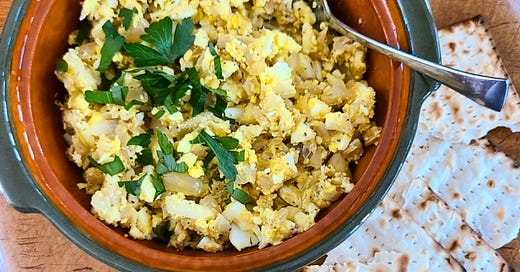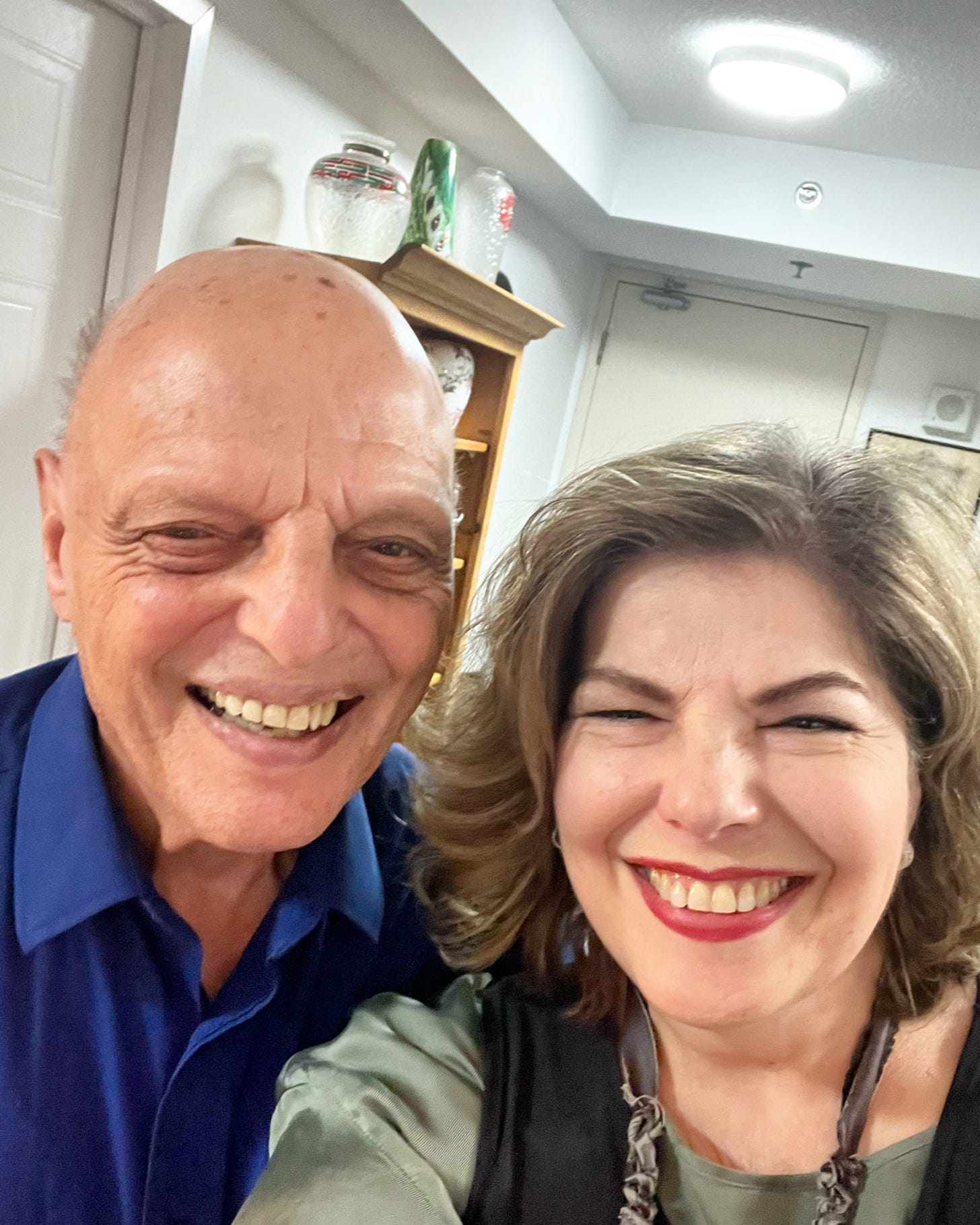Who would have thought a murderous villain would introduce me to a wonderful new friend?
But such was the case last Saturday. We were on our way to see Bluebeard’s Castle, the early 20th-century opera written by Béla Bartók. Based on the 17th-century French folktale by Charles Perrault about a wealthy nobleman with a penchant for murdering his wives, this imaginative retelling casts Bluebeard as a devoted husband caring for his wife Judith, who is slipping into the mists of dementia.
We were looking forward to seeing Gerald Findlay, the acclaimed Canadian bass-baritone, in the title role. As it turned out, so was Stanley.
The beauty of serendipity
Give or take five minutes, and we may have never met Stan.
Like us, Stan was looking for the theatre at the Harbourfront Centre - no easy feat with nary a sign in sight. The three of us found ourselves at the same street corner, and when we discovered we were all going to the opera, we ventured off together to find our destination.
In the few minutes it took us to get to the theatre, we learned that Stan is a 90-year old practicing lawyer, a storyteller, a lover of music, a deeply spiritual soul with a curious mind and a joie de vivre that is infectious.
We also found out that Stan had taken a taxi to get downtown, with the well-founded fear that, even on a Saturday afternoon, public transit safety can be spotty at best.
We parted ways to find our seats, and as we settled into ours, I said to Richard, “Let’s give Stan a ride home after the opera.” In retrospect, it might have seemed odd or even slightly dangerous for Stan to take a ride from two perfect strangers. After all, we had only just met. But he gladly accepted and off we went.
Room at the table
As we drove, we learned that Stan was joining a friend for dinner, after a visit with his ailing wife. But the opera and the journey back uptown was taking longer than anticipated, so Stan asked if we would mind dropping him directly at his friend’s place. He called Orestes to let him know he was en route and then said, “Orestes, a very nice young couple is driving me to your place. Shall I bring them up?”
That’s how we found ourselves around Orestes’ cozy table, sharing a gourmet meal of red wine-braised lamb shanks and the silkiest mashed potatoes with two people we hadn’t known a mere four hours ago.
As we chatted Stan said, “You know, I’m hosting a most untraditional Seder dinner on Wednesday. Will you and Richard join me?” And thus the circle of friendship kept expanding in concentric waves, enveloping us in its warm embrace.
Our Seder dinner was wonderful. We had a chance to meet Stan’s granddaughter and her partner, his grandson’s girlfriend and of course Orestes again. Orestes shared perhaps one of the most wonderful parts of this most unusual of chance meetings. Orestes had originally bought just two lamb shanks for his dinner with Stan. But as he recounted, “I suddenly got the thought that I would go and buy two more, and give them to Stan to bring home. When I got to the grocery store, there were exactly two lamb shanks left.” And as if by magic, there we were, the grateful guests to his unplanned hospitality and those two extra lamb shanks.
If you are Jewish, or have been a guest at a Seder dinner, you know that core to the evening are the readings from the Haggadah. Stan was right when he said that his Seder would be most untraditional. Instead of readings from the Haggadah, he asked each guest to come to dinner with something they wanted to share: a poem, a reading, a favourite quote - something that has personal meaning. In his wisdom Stan understands that spirituality and meaning come from everywhere.
As Mark Gerson says in The Telling: How Judaism’s Essential Book Reveals the Meaning of Life, “It is deeply instructive that Pesach should be the moment when we consider the fact that multiple interpretations of the same thing can be right.”
Richard read an excerpt from the novel he is writing; Emma shared her “word of the day”, Samantha read a poem, and Stan read Psalm 23, and a passage from Virginia Woolf’s To the Lighthouse.
I read one of my favourite poems by Mary Oliver. It sums up the fullness in my heart after the gifts of this week, and the refrain that beats like a drum: when you feel joy, don’t hesitate.
Don’t Hesitate
If you suddenly and unexpectedly feel joy,
don’t hesitate. Give in to it. There are plenty
of lives and whole towns destroyed or about
to be. We are not wise, and not very often
kind. And much can never be redeemed.
Still, life has some possibility left. Perhaps this
is its way of fighting back, that sometimes
something happens better than all the riches
or power in the world. It could be anything,
but very likely you notice it in the instant
when love begins. Anyway, that’s often the
case. Anyway, whatever it is, don’t be afraid
of its plenty. Joy is not made to be a crumb.
—Mary Oliver
If you should see someone who may need you, don’t hesitate. You can never know what riches lie ahead.
Egg and onion
Lisa Goldberg, adapted by Joan Nathan
serves 6
Chopped liver is a classic Ashkenazi dish that’s often served as part of the Passover celebrations, or just because. But not everyone is a liver fan, so consider this dish an entry level introduction - chopped liver without the liver, if you will.
This version uses chicken fat, known as schmaltz, to fry up the onions; vegetable oil can be subbed in to make a vegetarian version. It’s great any time and especially wonderful with friends old and new.
Ingredients
1½ large yellow onions, peeled and roughly chopped into ½-inch dice
½ cup chicken fat (schmaltz) or vegetable oil
6 large eggs
Sea salt and freshly ground black pepper
Chopped tarragon, chives or parsley, for garnish
Matzoh, broken into bite sized pieces, for serving, or other simple cracker
Put the onions and schmaltz in a large frying pan and cook over medium heat, stirring occasionally, for about 20 minutes, or until the onions are golden brown and very soft.
Meanwhile, put the eggs in a medium saucepan, cover with cold water and bring to a boil. When the water comes to a boil, turn off the heat, cover the pan and let the eggs sit for 15 minutes. Prepare an ice bath. Drain the eggs and place them in the ice bath for 10 minutes. Drain and dry. Peel the eggs and transfer them to a medium serving bowl. Coarsely mash the eggs with a fork.
When the onions are caramelized, transfer them to the eggs with a slotted spoon. Gently mix with a fork or spoon. Season generously with salt and pepper. If the mixture seems too dry, add a little oil from the pan. The mixture should stick together if pressed with your fingers, but should not be oily. Sprinkle with herbs before serving warm or at room temperature. Serve with matzoh on the side.








What a great story! 💕
Chag sameach! And amazing story. I will try this with chickpea flour or vegan eggs 😋